- Home
- David Guterson
Descent Page 4
Descent Read online
Page 4
The parking lot eventually looked tidy and handsome but I was not improved by sweeping leaves. Nor by my seven minutes behind the mike at a breakfast designed to pry open the checkbooks of potential public school donors. Nor by my meeting with a soft-spoken philanthropist who ever so gently solicited my help in establishing a fund for free expression. Nor by coaching boys at basketball (another duty calendarized early, in my pre-9/11 glory days), since the most conspicuous presence in the gym, inappropriately unenthusiastic, was the wan, ghost-like presence on the bench incapable of calling a timeout. I was no inspiration and no tactician, and hardly capable of waiting tearless in the car while players bought restoratives at a mini-mart. As they swallowed their colored sports drinks and jostled, cruelly dissected friends and peers, and manipulated restlessly their headphones and music players, I offered in return but a notable silence (notable in that I’d once engaged them in a spirited if dubious manner, though none of them now asked me what was wrong). I’d lost my touch, and well before halftime. I couldn’t be a coach to boys any longer. The august argument for moral action on which I’d been raised as if it was milk had exposed itself to me for what it was—another false Beckerian strategy, heroism devised to subvert death’s chorus, which otherwise rang in such high decibels as to silence the rest of reality. Why do anything? These boys must die, too, in the fullness of time. They would rot to make way for more boys to rot. If they wanted to use the word fuck along the way, in grammatical permutations to mean nearly everything, on what grounds might I object?
If nihilism is the belief that life is pointless and human values by extension worthless, then depression is nihilism’s performance art or dull choreography. Since there is no point any longer to anything and everything, there is also, and especially, no point to the right thing. To the depressed, idealists exist as proof that Becker is correct. The moralist’s zeal is a denial of chaos, his quest for order a frightened insistence on life’s victory over death. But in the end, as we all know, death wins.
Toward the end of the month I went dutifully to Summit House, where the last of my maternal aunts lived, widowed. I’d promised six months prior to regale the seniors there with my energetic and youthful presence (and now couldn’t countenance canceling, since my aunt seemed so eager regarding my visit) and to entertain them with hard-won insights that might be of interest to the bookish among them. I’d assumed that my audience, advanced in years, would be immune to my customary passionate pontificating on the uplifting splendor of stories. So I had planned to be jocular, provincial, and at ease, not just for their sake but for mine simultaneously, as a means of putting some distance between us, a broad-shouldered wall from whose high crenellations I could proffer anecdotes in free association and extemporize on the absurdity of an author’s grand life—less dogmatic than my tried-and-true dog-and-pony show, and I hoped as well less sleep-inducing.
My aunt, with her translucent, prosthetic cane and sturdy support hose the color of chaff, met me in the Summit’s foyer. We were late for dinner and so she was urgent even as I pecked her furrowed cheek and greeted her with whispered vapidities. I was ushered forth and in the dining hall—an antediluvian cave, well-appointed—found myself where no one at table was under seven decades. Herewith lipstick on water glasses and salad forks guided by palsied fingers toward half-opened, listless maws. Forgotten captains of Seattle industry and blue-haired stewards of archaic civic missions were gathered together over breast of chicken. Eau de toilette and, embarrassingly, urine—a high, thin, and acidic emanation mingling with the smell of my low-sodium dinner. A sour, humid, ammoniated effluvium that must also be an appetite’s death knell—not that I’d brought an appetite.
Impaled, I greeted and engaged my tablemates, who clearly didn’t hear very well. The tinkling of silver and of iced tea goblets fell weak and watered-down as I discerned that the woman to my right was freshly widowed and transplanted of late from the upper Midwest for the convenience of her adult son. I couldn’t make sense of her relative tranquillity or of the authenticity with which she reported her satisfaction with life at this sanitized, last-stop way station. How could she not be utterly depressed? How could it be that she wasn’t in agony with her husband of many years just buried and her home in Sheboygan (or was it Kokomo or Ames) sold to the highest bidder? I began to sob into my scalloped potatoes, but so delicately as to conceal most of my angst while to my left my aunt ate with practical vigor, evidently intending to redeem our late start and clear the decks for dessert. Across from me, a small septuagenarian picked ineffectually at his romaine leaves, a nebbish residing against his will in the shell of his decaying and desiccated body: Woody Allen’s humorless cousin. In answer to my self-referential, cut-to-the-chase queries, he confessed he’d been depressed for fifty-two years—“from the day I got married, that same hour” (it hadn’t ended with his wife’s death, he added)—and to favoring death over rising to the world. (“Every night I hope I die in my sleep,” he said, barely audible, to which my aunt replied, with her mouth full of steamed corn, “Don’t say that.”) Like me he was a Klonopin devotee and preferred so long as he had to be breathing to do so in bed with his head beneath a pillow. Yet he wasn’t allowed this muffled consolation. An in-house, cheery someone came to his apartment each morning and cajoled him toward the world of the living by helping him into his underpants and loading up his toothbrush. Enough already. I excused myself and fled to the bathroom, where I hung my head in a toilet stall until it was time to entertain the seniors. As it turned out, the crowd wasn’t large. A heckler explained that he knew my parents, then asked me in an accusatory vein why I didn’t “write Jewish, like Isaac Singer.” But most simply looked prepared for bed or leaned politely on their walkers. I spoke in a whisper, apologizing at intervals for my feeble execution. Yet no one seemed to notice my contritions. And afterward, there were few books to sign. This audience didn’t want mementos.
I have been treading on leaves all day until I am autumn-tired. Halloween night I peeked voyeuristically over my daughter’s costumed shoulder into the rainy lives of my neighbors and saw that most were watching television. Each adrift in his own den of light. Each alone on this shifting earth at a place where tectonic plates cross paths, watching news shows or football. Me some yards up the glistening walk, rain-hooded, darkly unrecognizable, in affect grim and ghoulish. I took no joy in my daughter’s joy or in the leaves illuminated by outdoor lighting and instead saw each home as a flimsy facade: thin lath and siding set against the darkness. Just a few inches lay between us all and the second law of thermodynamics. Why was it that the sight of cars in garages—mostly well-washed SUVs—reminded me that the universe is steadily devolving toward a cold and unlit eternity? My neighbors were old but not too old, and gave no hint of the desperation with which, I felt certain, they enjoyed their golden years. Two easy chairs, a large-screen Sony, two glasses of late-evening Burgundy.
So persisted the war against my ego, depression’s strategy of psychological attrition. By November I was stripped of most of my leaves, laid bare and reduced to a silhouette of fretwork, not much more than lacy interstices, the nothingness in me come to fruition. I suppose I stood stark against the horizon, with just one meager leaf or two hanging on by enervated petioles, tattered, brown, wind-battered: a tree drawn by Charles Schulz. My depression, until now mostly metaphysical in nature, imploded to include me transcendentally—Whitman without the delight or optimism—and I was blanched, blighted, and brought to my zero hour. “They cannot scare me with their empty spaces,” Frost wrote, “Between stars—on stars where no human race is. / I have it in me so much nearer home / To scare myself with my own desert places.”
* * *
My depression became formidable in the manner of a python, whose modus operandi is suffocation. On every exhalation of its bound-in victim, the python ruthlessly intensifies constriction before swallowing the corpus whole. My own exhalations in this losing vein occurred while crossing from sleep into waking, an od
d nexus—a no-man’s-land—where I didn’t feel depressed. The sensation was both ephemeral and tantalizing, an interlude of no more than five or ten seconds passed in twilit consciousness. “I don’t feel depressed,” I would silently remark, but that observation was like breathing out while seized in the coils of the snake.
So I was crushed that November. Suffocation, being slow, left me much time to think and to observe the interminable quality of my suffocating. Time slackened noticeably, a bad thing when the tenor of the hours is anguish. Again there was the notion of suicide to play with at a distinctly delicate distance. (Thinking about suicide was like thinking about space travel. You weren’t going to do it, but on the other hand, it was hard not to contemplate available means to leave the Earth behind.) In the dangerously silent hours of midday I sometimes wept ferociously over the intransigence of eternity; or the durable power of my antagonist, depression; or in response to some piercing tome I was reading, such as A Guide to the Bodhisattva Way of Life, whose author, Shantideva, flogged me with “While I am lying in bed, / Although surrounded by my friends and relatives, / The feeling of life being severed / Will be experienced by me alone.”
Such darkness seemed unnecessary and unrelieved by the chapters of Buddhist instruction that followed, or at any rate stayed with me with a more pregnant intensity than the monk’s more hopeful musings. I read on. I plunged into books in pursuit of my salvation and as if to test a debatable contention, clung to during my years as a writer: that scribbling on pages meant something. The stack beside my bed grew ponderous—the Dalai Lama, Alan Watts, Thich Nhat Hanh, the Venerable Henepola Gunaratana. Not one spurred any happy enlightenment, and some were painfully counterproductive, though none quite so throttling as Becker had been while the leaves turned in early October. Milarepa. Martin Buber. Harold Kushner. Thomas Merton. There they sat beside the nightstand, askew and brimming with empty consolations. I even made a foray into my set of Great Books, breaking in at the four-year mark, wherein I found Montaigne maintaining what many before and after him maintained—“let us deprive death of its strangeness, let us frequent it, let us get used to it; let us have nothing more often in mind than death”—in my case this was preaching to the choir in untherapeutic strains.
Desperately grasping at any and all straws, I started a regimen of Saint John’s wort and 5-HTP. The former seemed a medieval paregoric (its active agent is hypericum; it was once believed to preserve its adherents against both devils and malicious fairies); the latter sounded like a motor oil additive or a tonic as conceived by Aldous Huxley. These nostrums could be had without prescription and were readily available, if expensively, from retailers who also sold essential oils, floral waters, and sacred bark powder. Saint John’s wort, as Andrew Solomon reported in The Noonday Demon: An Atlas of Depression, was “all the rage in northern Europe,” and there did battle with Teutonic melancholy, Norwegian despair, and the chilly dispositions of the Danes. 5-HTP could be produced synthetically but the good stuff was extracted from Griffonia simplicifolia, a tree of Ghana and the Ivory Coast. I swallowed both the African and European anodynes, then scrutinized the Yellow Pages for someone other than Todd. A Foot in the Door, A Path to Wholeness, About Getting Better, those were the As under Counseling, bookended three intense pages later—body issues, coping, pet loss, divorce—by Wounded Heart Ministries. I suppose I’d known that the world was choked with every hue and manner of sorrow, but in so many distinctly contemporary colors? Were the counselors in league, conspiratorially, with the capitalists, whose job it was to deliver damaged souls and ad-saturated psychotics? My skepticism was still unhealthily intact—skepticism, the ego’s livery, driving me away from a needed assistance. I didn’t trust anybody’s wisdom or motive. What could be said that hadn’t been said? The Yellow Pages copy was consistently banal. Every life can be better (than OK). New solutions to old problems. Restoring what’s important to you. Problem resolution, not symptom maintenance. All of this between Costumes (Masquerade & Theatrical) and Countertops.
I was, in November, increasingly panicked. My depression, I knew, enveloped my family and cast its shadow through the rooms of our house. My children had noted my malaise and weight loss and were right to feel that “under the weather” didn’t accurately explain what they saw. Even the dogs looked needy and quizzical. In the face of this I berated myself, and suffered because my suffering seemed contagious.
The stigma of depression is in part its ridiculousness in the eyes of healthy beholders. To the undepressed it looks weepy and consternating, saturated with self-absorption, spineless, and unseemly. (I know because I’d been brazenly undepressed and had inhabited that happy orbit for more than forty-five years.) Pull out of it already. We all have our days. And for a man, too, with all that can imply—how can a man be so distraught, unable to buck up for the looming showdown, prone to shell shock at the moment of truth, and otherwise reduced to sodden ashes? How can it be? Who would predict it? (Though there’s a hint in the visage of the Marlboro Man of too much existential brooding.) A man who has lived an exemplary sane life, a life of probity and bills promptly paid, a life in obeisance to the rules presumed to govern happiness? Isn’t it the point of this man’s persona that he ought to be immune to wretchedness?
But that is like being astonished to hear that this same man suffers from kidney stones. Kings, knaves, philosophers, actuaries, Girl Scouts, baristas, Wichita linemen—depression is, in one of Styron’s conceits, “as assertively democratic as a Norman Rockwell poster,” and perdition is egalitarian. Nevertheless, I was ashamed to be me. I judged myself. I split in two. At a remove, I lashed my dour, stricken shadow, and my cup ran over with self-loathing.
On the eighth of November I divulged my plight to a beneficent psychiatrist fifteen years my senior, a man with a sonorous and deliberate speaking style and a reassuring way of inhabiting his chair, a Dr. K——whose poise while I yowled was pitched to the spectacle. I called him “Doctor” during our sessions, my deference untainted by irony or aggression but not lacking in the corrosive awareness that either interpretation was conceivable. (I was outwardly sincere in the throes of depression; one of its less empty consolations is its tendency to sear clean the vocal cords.) K——seemed capable of an unpolluted tenderness, and so, with broad strokes and embellishments both, I gave him to see that I was thoroughly harrowed, acutely subsumed, out of my gourd, adrift on dark waters, and all of this most painfully, and that such ordeal had occasioned my phone call of exactly a week ago and now my desperate visit, for which I’d lived the past 168 hours in the hope of an imminent, miraculous reversal and of salvation at the hands of bona fide psychiatry—I had, in short, high hopes for talk despite a past tendency to scoff. K——, in reply, didn’t raise an eyebrow or lift his head from his majestic hands. His mute disinterest seemed consciously wrought as he heard me out like a diagnostician possessed of a professional but heartfelt neutrality—no urging me on toward greater candor by dint of gesture or of pitying expression—this from the school of “active listening” and to thwart the patient’s natural tendency to include the therapist in his disease. However it was, I felt drawn to K——, his refreshingly old-school cantlessness and cut-to-the-chase protestations.
K——prescribed Prozac. A child’s dose, in deference to my fear and shame, but still it was Prozac, that most famous of happy pills. This new panacea wasn’t Xanax or Klonopin, which are benzodiazepines, designed to leave you dull but intact; this was a “selective seratonin reuptake inhibitor,” a pill I understood as an overhaul or makeover, a brain destroyer and a soul stealer. These magic bullets were like Huxley’s brave new soma pills, the pills THX 1138 didn’t take in George Lucas’s dissertation film, McMurphy’s electroshock therapy, an Orwellian reeducation as a lozenge, a vampire bite as a tablet. Invasion of the Body Snatchers, or maybe Night of the Living Dead, expressed as a prescription. I was about to be obliterated, but as thoroughly wrecked and diminished as I was, that was possibly fine with me. Rebirth in the Mat
rix seemed, at this stage, an enormously desirable illusion. On the other hand, I was also a purist, a term that spins favorably my pill paranoia, and felt stricken by K——’s pharmaceutical broadside, though I knew from my brother’s pro bono guidance that pills were favored by the trained. The idea was the efficacy of pill ministration in concert with intense and persistent talk—psychiatry’s redoubtable two-pronged offensive, maximally proficient and doubly dear (though no doubt worth every penny spent), obliquely to face down the gorgon of depression with a proven, if costly, redundancy. But what sort of talk, and with whom, about what? Would I swoon, next, across the Freudian couch, wincing and reading Rorschach blots, free-associating while a bearded shrink à la Edward Sorel hemmed, hawed, and hmmed? Perhaps not usefully. “When I hear of psychoanalysis being used to ameliorate depression,” Andrew Solomon undrily asserts in The Noonday Demon, “I think of someone standing on a sandbar and firing a machine gun at the incoming tide.” I had similar reservations and broached them with K——, who responded by suggesting Jungian analysis, since I was probably too skeptical for cognitive behavioral therapy and its transparent manipulations. (“I’m thinking bad thoughts. I’m being negative. I will now think only good thoughts.” That’s the gist if an unfair summation of a cognitive behavioral education in optimism, which involves a lot of practical and immediate rewiring.) In the end, though, it didn’t matter what K——suggested—Jungian, Reichian, or transactional analysis, vegetotherapy or a 12-step program. I would have done whatever he advised.

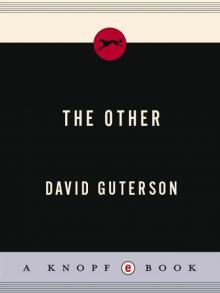 The Other
The Other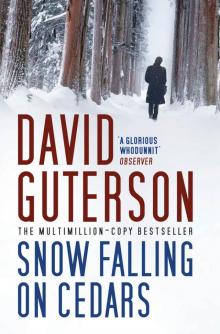 Snow Falling on Cedars
Snow Falling on Cedars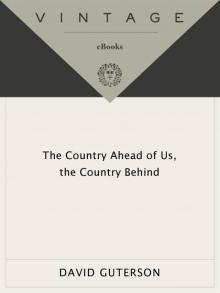 The Country Ahead of Us, the Country Behind
The Country Ahead of Us, the Country Behind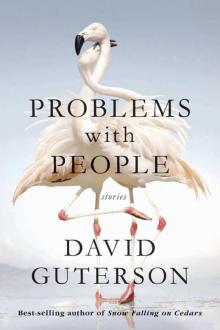 Problems With People: Stories
Problems With People: Stories East of the Mountains
East of the Mountains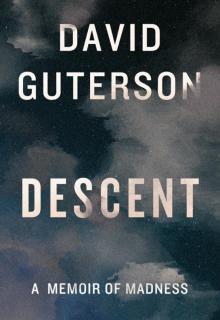 Descent: A Memoir of Madness
Descent: A Memoir of Madness Our Lady of the Forest
Our Lady of the Forest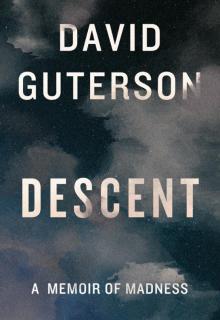 Descent
Descent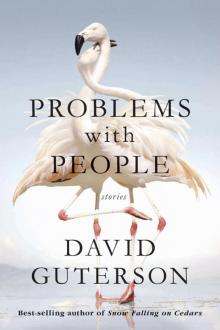 Problems with People
Problems with People